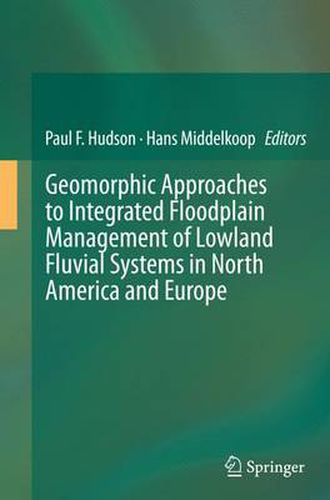Readings Newsletter
Become a Readings Member to make your shopping experience even easier.
Sign in or sign up for free!
You’re not far away from qualifying for FREE standard shipping within Australia
You’ve qualified for FREE standard shipping within Australia
The cart is loading…






This title is printed to order. This book may have been self-published. If so, we cannot guarantee the quality of the content. In the main most books will have gone through the editing process however some may not. We therefore suggest that you be aware of this before ordering this book. If in doubt check either the author or publisher’s details as we are unable to accept any returns unless they are faulty. Please contact us if you have any questions.
This volume provides a comprehensive perspective on geomorphic approaches to management of lowland alluvial rivers in North America and Europe. Many lowland rivers have been heavily managed for flood control and navigation for decades or centuries, resulting in engineered channels and embanked floodplains with substantially altered sediment loads and geomorphic processes. Over the past decade, floodplain management of many lowland rivers has taken on new importance because of concerns about the potential for global environmental change to alter floodplain processes, necessitating revised management strategies that minimize flood risk while enhancing environmental attributes of floodplains influenced by local embankments and upstream dams.
Recognition of the failure of old perspectives on river management and the need to enhance environmental sustainability has stimulated a new approach to river management. The manner that river restoration and integrated management are implemented, however, requires a case study approach that takes into account the impact of historic human impacts to the system, especially engineering. The river basins examined in this volume provide a representative coverage of the drainage of North America and Europe, taking into account a range of climatic and physiographic provinces. They include the 1) Sacramento (California, USA), 2) San Joaquin (California), 3) Missouri (Missouri, USA), 4) Red (Manitoba, Canada and Minnesota, USA), 5) Mississippi (Louisiana, USA), 6) Kissimmee (Florida, USA), 7) Ebro (Spain), 8) Rhone (France), 9) Rhine (Netherlands), 10) Danube (Romania), and 11) Volga (Russian Federation) Rivers. The case studies covered in these chapters span a range of fluvial modes of adjustment, including sediment, channel, hydrologic regime, floodplains, as well as ecosystem and environmental associations.
$9.00 standard shipping within Australia
FREE standard shipping within Australia for orders over $100.00
Express & International shipping calculated at checkout
This title is printed to order. This book may have been self-published. If so, we cannot guarantee the quality of the content. In the main most books will have gone through the editing process however some may not. We therefore suggest that you be aware of this before ordering this book. If in doubt check either the author or publisher’s details as we are unable to accept any returns unless they are faulty. Please contact us if you have any questions.
This volume provides a comprehensive perspective on geomorphic approaches to management of lowland alluvial rivers in North America and Europe. Many lowland rivers have been heavily managed for flood control and navigation for decades or centuries, resulting in engineered channels and embanked floodplains with substantially altered sediment loads and geomorphic processes. Over the past decade, floodplain management of many lowland rivers has taken on new importance because of concerns about the potential for global environmental change to alter floodplain processes, necessitating revised management strategies that minimize flood risk while enhancing environmental attributes of floodplains influenced by local embankments and upstream dams.
Recognition of the failure of old perspectives on river management and the need to enhance environmental sustainability has stimulated a new approach to river management. The manner that river restoration and integrated management are implemented, however, requires a case study approach that takes into account the impact of historic human impacts to the system, especially engineering. The river basins examined in this volume provide a representative coverage of the drainage of North America and Europe, taking into account a range of climatic and physiographic provinces. They include the 1) Sacramento (California, USA), 2) San Joaquin (California), 3) Missouri (Missouri, USA), 4) Red (Manitoba, Canada and Minnesota, USA), 5) Mississippi (Louisiana, USA), 6) Kissimmee (Florida, USA), 7) Ebro (Spain), 8) Rhone (France), 9) Rhine (Netherlands), 10) Danube (Romania), and 11) Volga (Russian Federation) Rivers. The case studies covered in these chapters span a range of fluvial modes of adjustment, including sediment, channel, hydrologic regime, floodplains, as well as ecosystem and environmental associations.